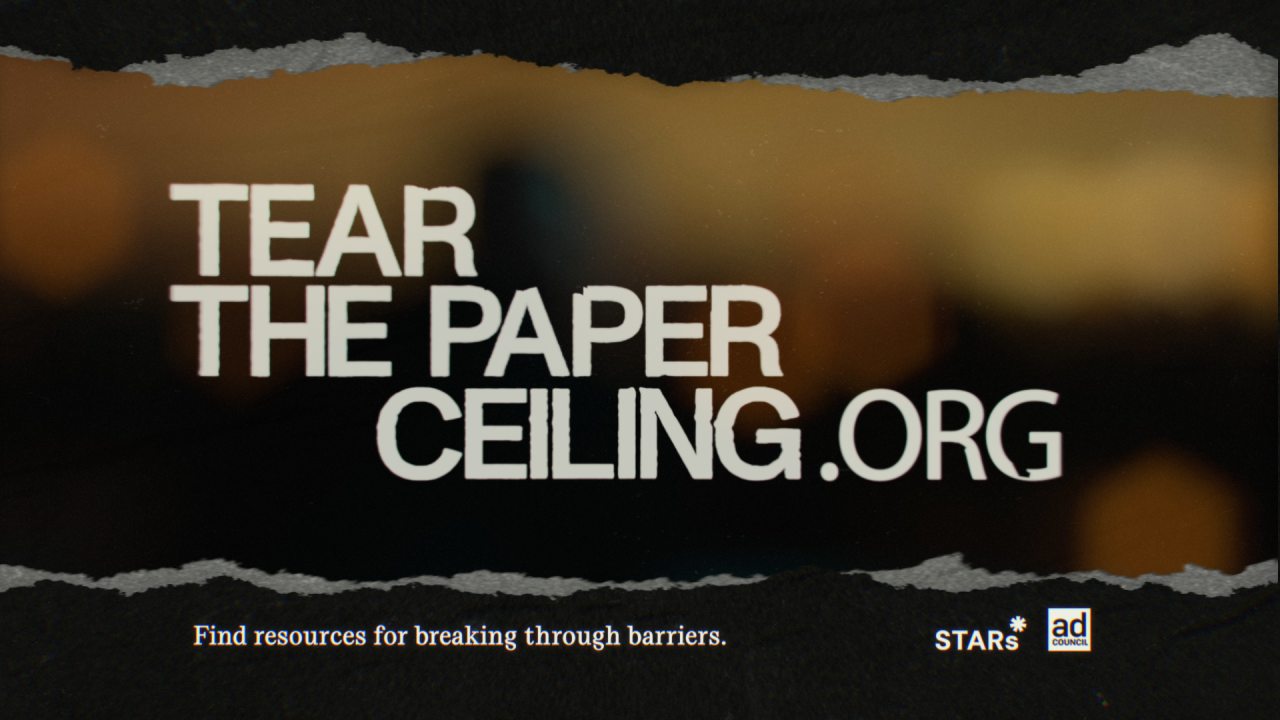
It’s Time to Tear the Paper Ceiling - Watch and Share This Video
Workers with experience, skills, and diverse perspectives are being held back by an invisible barrier – the “paper ceiling.” The paper ceiling represents the degree screens, biased algorithms, stereotypes, and exclusive professional networking that block career opportunities for 70+ million U.S. workers who are STARs, Skilled Through Alternative Routes rather than by a bachelor’s degree.
Those who follow me may have heard about our “Tear the Paper Ceiling” campaign – and today I’m proud and excited to share with you this 60-second video that Opportunity@Work created in partnership with the Ad Council, Ogilvy, and STARs that will soon be shown across the nation. Please watch it now. I’d love to hear any reactions you have in this thread, and if it makes an impression on you – please share this video with everyone you think should see it.
This paper ceiling is not only hiring red tape – it’s harmful: it hurts employers, it hurts STARs and it hurts our economy. We hear from STARs all the time, both anecdotally and in Opportunity@Work’s extensive quantitative and qualitative research that shaped the campaign: “I have the skills to do the job, but employers won’t even consider me – all because of a piece of paper.”
The problem is not “the paper” – learning is a good thing, and college degrees can reflect important learning. The problem is when that piece of paper is used as a “ceiling” to screen out STARs with the very skills employers need for unfilled jobs. These pointless and self-harming barriers block STARs from translating their valuable, job-relevant learning into higher earnings. That’s the paper ceiling.
If companies contributed to create the paper ceiling, mostly by accident, it’s now past time to tear the paper ceiling and see all the talent we need for our industries, our economy, and our country to succeed. And we’ll tear the paper ceiling together, on purpose.
Everyone has a role to play in helping tear the paper ceiling and changing the narrative around STARs. At TearThePaperCeiling.org, the campaign provides resources for businesses, talent developers, STARs, and their supporters. Employers can access a playbook to help you get started with skills-based hiring practices in your organization and develop more equitable talent strategies; STARs can share their stories; and all supporters can sign a pledge to support STARs and download shareable social media assets.
What can you do today? Share this video.
All the best,
Byron
MULTIPOTENTIALITE | Pythonic Business Solutions Specialist | Idea Synthesis | AI Implementations | SMS Customer Engagement Specialist | Desktop Solutions Developer
5moDespite that ceiling, I am determined to succeed. Granted, the strides tend to be a bit lengthier and a smidge heavy, but I really believe that my hard work will pay off as long as I keep moving forward. I wonder how many people could have made monumental, positive changes in this world if they were only noticed or given a chance. Here's to all of you!
Executive Producer Dancing for Life; Young Choreographers' Showcase
8moShare via a post and with my Human Resource & DREI department.
Motion Graphics Animator and Programmer, Video Editor, Solutions Developer
11moI had no idea that the phenomenon was prevalent enough to have an industry term until I saw this ad just a couple of hours ago. The YouTube algorithm clearly knew I was among the affected. Yeah, too close to home, this one.
Creative Writer
1yThis is phenomenal.
Chief Executive Officer at Cengage Group
1yWhat a powerful video and campaign, Byron. Thank you for raising this important issue. There's a clear misalignment with how employers are thinking about skills as our recent research found that 62% of employers require a degree for entry-level jobs, even though nearly half (43%) of employers admit that skills training credentials are more important than a degree when considering a candidate. It's far past time for employers to reconsider their hiring practices and open the door to this group of highly undervalued candidates.